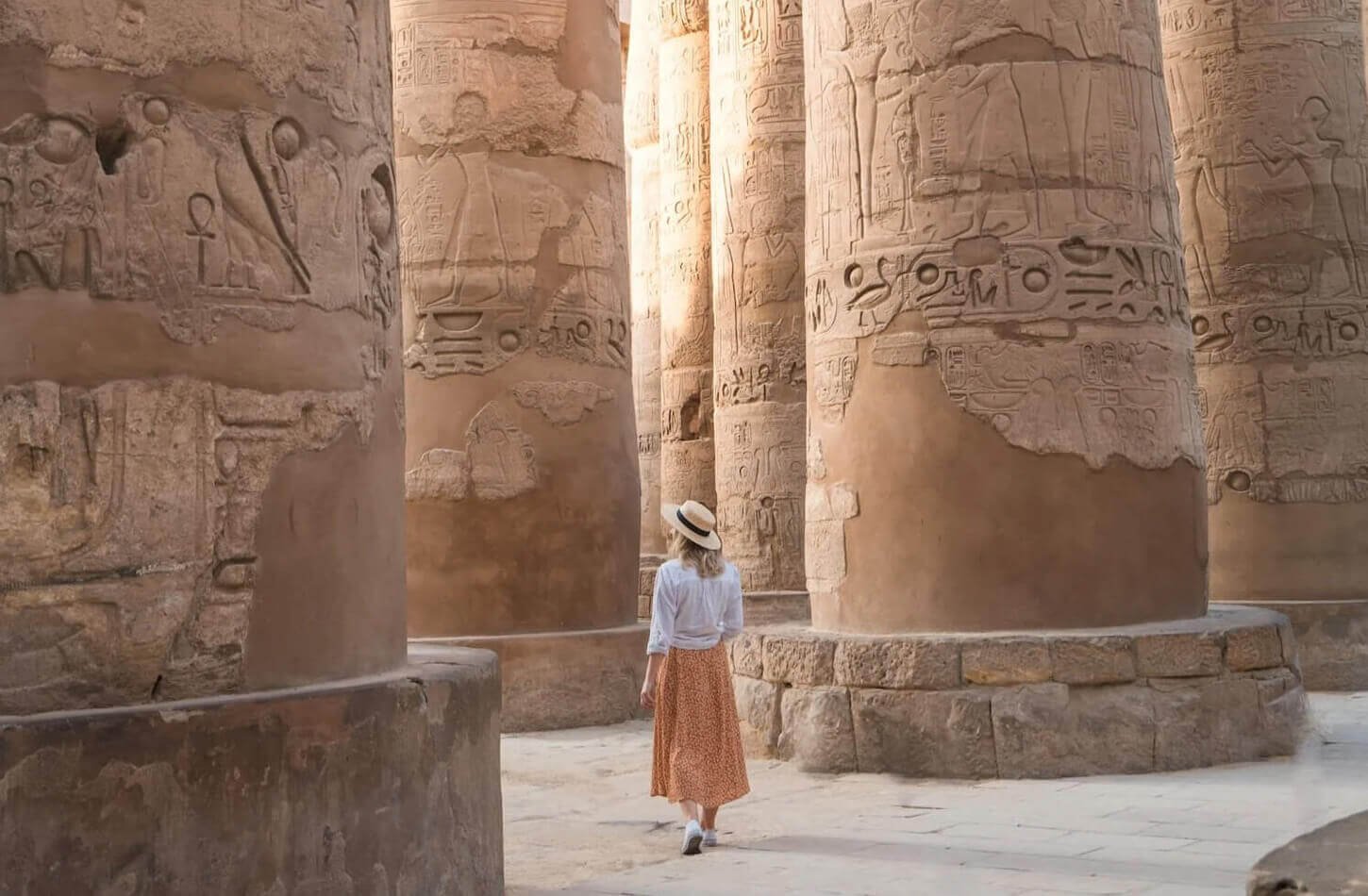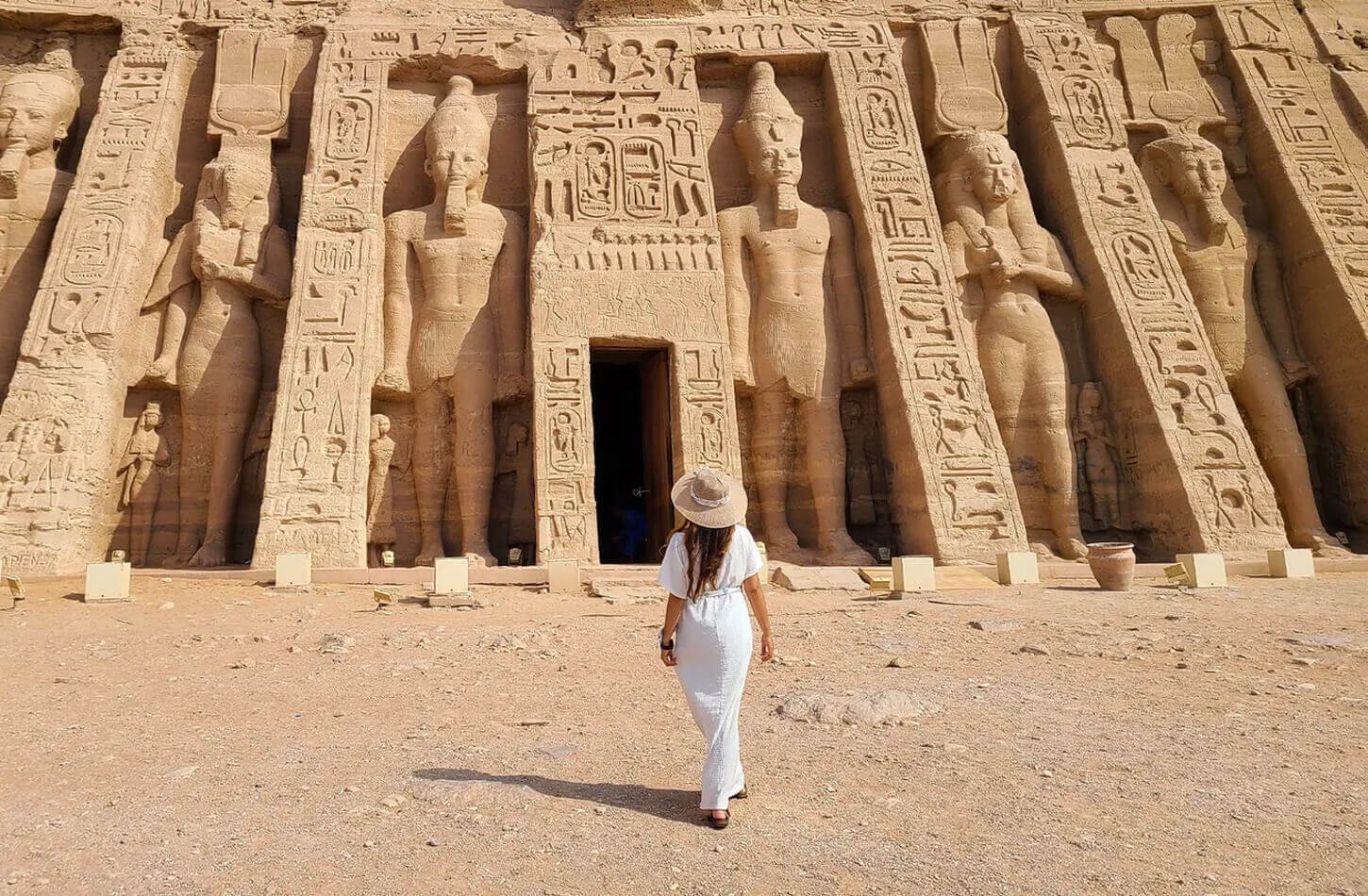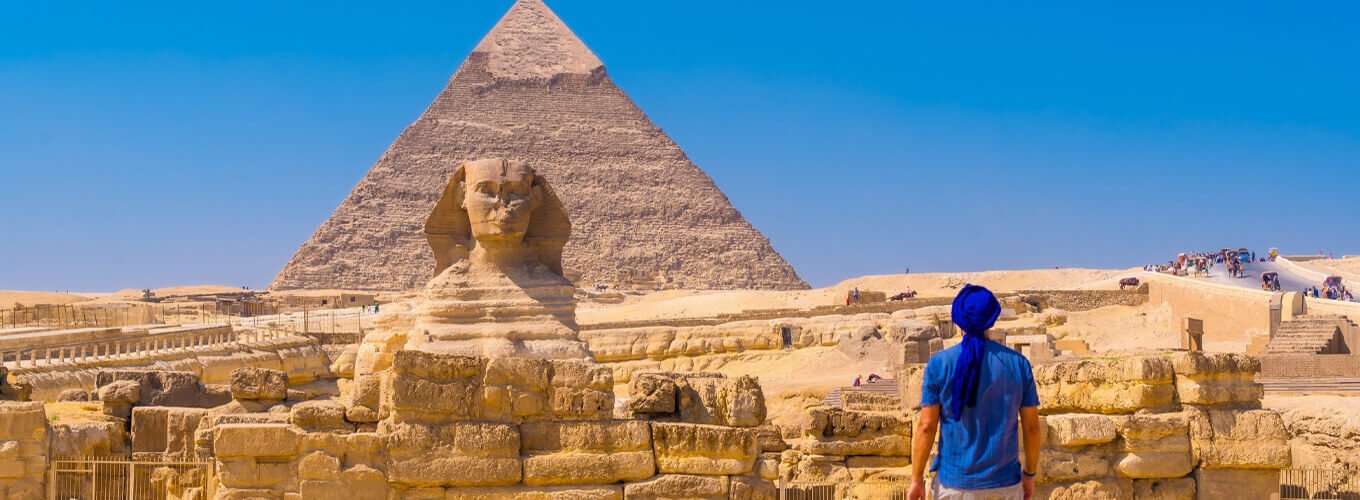Have you wondered how to see the ancient wonders without getting swallowed by crowds or logistics? This guide gives you a locals‑level overview so your first days feel exciting, not overwhelming.
You’ll get clear, practical advice on timing, safety, transport, money, and health. Expect jaw‑dropping sites alongside moments of culture adjustment; a little preparation makes your trip far smoother.
English is common in major hubs, but once you leave busy centers, patience, gestures, and simple phrases matter. Security at hotels and attractions can feel intense at first; it’s there to protect you and quickly becomes routine.
Hotel value is often strong, with comfort and service that beat many North American options, though beds can be firmer than you’re used to. Read on and you’ll learn how to pace days, dress respectfully, and handle hustles with confidence.
Key Takeaways
- Plan days around heat and site hours to make the most of your trip.
- Learn a few simple phrases and use patience off the beaten path.
- Expect security checks at hotels and major attractions; they’re standard.
- Upscale hotels often offer good value, but beds may feel firmer.
- This guide focuses on practical, place‑by‑place advice for a calmer experience.
What to Expect on Your First Trip to Egypt
Your first visit mixes jaw‑dropping ruins with the practical hassles of modern site access. World‑famous sites often exceed the hype, but crowds, security checks, and persistent vendors can sap energy. Plan each day so you see fewer things well instead of many things poorly.
Ancient wonders vs. modern realities
Expect long lines and metal detectors at key entrances. Arrive early for calmer access and cooler temperatures. Guides, hotel staff, and airline crews commonly speak English in big cities, yet drivers and remote hosts may not.
Culture shock and pacing your days
Information overload at temples and tombs is real. Break visits into themed chunks—one major site and a lighter stop—and build buffers to hydrate and reflect. Tourist zones are sales‑heavy; practice a firm, friendly “no” and move on.
Practical advice: pick 1–2 non‑negotiables per day, carry a small notebook or notes app, and focus on experiences you’ll remember. This simple plan turns a dizzying first trip egypt into a manageable, rewarding guide for future days.

Best Time to Travel Egypt: Weather, Crowds, and Costs
Choosing the right time shapes almost every part of your visit — weather, crowds, and price all hinge on timing. Aim for October–April for cooler days, clearer skies, and smaller crowds than peak summer months.
Peak season runs December–February. Expect more tourists and higher prices for popular stays and flights in major cities. Book early if you travel in this window.
Summer (June–August) gets hot fast. Temperatures in Upper Egypt often reach 29–41°C (85–105°F); Luxor and Aswan are the hottest spots. Schedule temple visits at dawn or dusk to avoid midday heat.
Layers are essential year‑round. Nights can be cool — January mornings might drop into the 40s–50s°F, while daytime highs vary by destination. Wear breathable fabrics and sun protection for midday comfort.
Domestic flights are efficient and affordable, a smart way to bridge far‑flung cities. Carry water and hydrate after each big site. Use early and late light for photos, then rest in the middle of the day to keep your trip enjoyable.
Respecting Local Culture and Dress Codes
Simple clothing choices let you move through religious spaces and crowded sites with confidence. Modest dress is the respectful baseline, and it also keeps attention low and interactions friendlier.
Conservative clothing norms for men and women
At mosques and religious spaces, cover shoulders and knees. Women should carry a light scarf in case hair covering is required inside certain mosques.
Men do best with airy long pants and short‑sleeve shirts. Avoid sleeveless tops and very short shorts in non‑resort settings to reduce unwanted attention.
Layering strategies for cities, tourist sites, and hot days
Hot days often see more casual dress at major tourist sites, but layers make adjustment easy. Pack a lightweight cardigan or shawl; you will use it from cool interiors to dusk by the river.
Choose breathable fabrics, loose cuts, and sun‑smart hats. Closed‑toe walking shoes or supportive sandals protect you on uneven ground and dusty paths.
Practical way to pack: keep a small tote with layers and neutral colors that hide dust. One quick tip: watch how locals dress where you are and match the level of formality — it’s the easiest way to feel at ease during your trip.
Staying Safe: Security, Checkpoints, and Feeling Comfortable
Visible security measures at major sites and hotels are part of the normal rhythm of visiting here. You’ll see tourism police, metal detectors, and bag scans at entrances. This presence is meant to protect you and keep sites open for visitors.
Major hotels often screen guests and vehicles, so add a few minutes to your arrival routine each day. At large attractions, security can feel like an airport—keep pockets light and your phone accessible.
Highway checkpoints commonly record passenger details and routes. Drivers or guides may receive a confirming phone call after you reach your next stop. Some roads need permits or timed convoys, so check rules before you set out to avoid losing a tour window.
After dark and in crowded tourist zones, pair up or travel in small groups. A companion helps defuse unwanted attention and makes navigation easier. Keep valuables zipped, use well‑lit routes, and accept help only from posted staff.
Practical actions
Carry a photocopy of your ID, share your arrival plan with hotel services, and brief your guide on any special issues or concerns. A calm, clear “no” and steady body language work better than confrontation.
How to Handle Hustles and Haggling Like a Local
A quick “hello” on a busy street can be the opening line of a sales pitch. Assume friendliness may be a way to start a sale. Keep your gaze ahead and walk on if you do not want to engage.
When “hello” means a sales pitch—and how to disengage
Accept nothing for free. Advice, photos, or directions offered without asking are often treated as a prelude to a fee. If someone follows, stop, face them briefly, say “no” once, and move on.
Negotiating prices and avoiding unsolicited guides at sites
Unsolicited guides may point out carvings and then expect payment. Decline firmly and stick to posted paths to avoid off‑limits areas. Always agree on a price before any service—photos, camel rides, or quick help.
Haggle with a smile: start low, move slowly, and set a walk‑away price beforehand. Shop when you have energy; tiredness makes you pay more. Carry small change to prevent inflated “no change” moments and keep negotiations clean.
Money, Prices, and Tipping in Egypt
Handle payments simply: carry a mix of card and cash to move through cities and markets without stress.
Cash vs. cards: ATMs, hotel payments, and when EGP is king
EGP is the local currency, and cash rules in small shops, stalls, and rural areas. Cards work well at midrange and high‑end hotels and restaurants, but you should top up at ATMs in towns.
Many ATMs sit in bank branches or hotel lobbies, so you can withdraw as needed and avoid carrying too much cash.
Baksheesh basics: small bills, typical tip amounts, and daily budgeting
Baksheesh is small and frequent. Plan a daily tip stash so you can handle helpers, restroom attendants, and cafe service without digging for change.
Restaurant norms hover near 10% (15% at nicer spots). Cafes: 5–10 EGP per order; restroom attendants: ~5 EGP.
Why single USD bills may not help and when to use Egyptian pounds
Banks often won’t accept single USD notes, and small bills slow down transactions. Use EGP for quick tips and small purchases—it’s easier for everyone.
Agree on the price before accepting photos, rides, or quick help. Keep hidden and daily wallets, and track spending on your phone to manage price expectations during your trip egypt.
Food, Water, and Staying Healthy
Staying well starts with simple choices about what you drink and eat each day. Tap water isn’t safe to drink, so use bottled water for drinking and brushing your teeth. Skip ice unless you know it comes from purified sources.
Bottled water and hot‑served drinks
When offered tea or coffee, ask whether the water was bottled. Many travelers politely decline if the source is unclear. Carry a small reusable bottle and buy sealed bottled water often.
Eat hot and fresh to avoid GI issues
Favor hot, freshly cooked food; heat kills most germs. Avoid raw salads and fruits you cannot peel. Choose grilled proteins, cooked vegetables, and breads fresh from the oven.
What to pack and simple hygiene habits
Bring electrolytes, anti‑diarrheals, pain relievers, and any prescriptions. Wash or sanitize your hands before eating and after handling cash.
Small extras help a lot: carry travel tissues or a small packet of paper for restrooms without supplies. These egypt travel tips in this guide are practical: hydrate often, choose hot food, sanitize, and rest when needed.
Getting Around: Flights, Trains, Buses, and City Rides
Getting between cities is easier than you expect if you pick the right mix of flights, coaches, and local rides. For longer hops, a short domestic flight often saves you time and stress. Airports commonly have two security checks—at entry and again at the gate—and liquids enforcement can vary, so keep purchases flexible.
Ground options and when to choose them
Go Bus offers comfortable, bookable coaches and is a smart, money‑savvy alternative to flying. By contrast, microbuses run informal routes, fill fast, and are best left to people who know the lines.
Trains work well on major corridors but can be crowded and hot on secondary routes. Weigh comfort and schedule before you buy a ticket.
City rides and airport transfers
In big cities, rideshare apps and taxis are inexpensive. Expect roughly 50–60 LE from the airport to downtown and about 100–110 LE to major sites like the Pyramids, depending on traffic.
Pre‑arrange pickups with your hotel or confirm any tour pickup points the day before to avoid curbside confusion. Using apps gives clearer pricing and reduces haggling.
Why you might skip driving yourself
Roads here can be aggressive: loose lane discipline, common speeding, and frequent accidents. If you value calm and safety, skip self‑drive and rely on drivers, trains, or buses instead.
Connectivity and SIM Cards
Staying online right after you land saves you time and stress. Many airports require an SMS code to use Wi‑Fi, so if your phone is in airplane mode you won’t get that message.
Airport Wi‑Fi code via SMS: the airplane‑mode problem
Airport Wi‑Fi often sends a one‑time code by SMS. If you keep cellular off to avoid roaming, the code never arrives and you lose valuable minutes. That delay can hold up ride pickups and check‑ins.
Local SIM card or eSIM: staying online the easy way
Buy a local sim card or preload an eSIM before you land so your phone connects the moment you reach the curb. Kiosks usually register your purchase with a passport, so have it handy.
A short data plan covers maps, messaging, and quick translations. If you prefer not to buy service, download offline maps and send your hotel ETA in advance so staff can assist if you hit delays.
Keep background apps limited and prioritize maps and messaging to save data. If you use dual‑SIM, keep your primary number active while using local data for navigation and bookings.

Smart Stays, Power, and Packable Essentials
A solid room, a simple adapter, and a few comfort items will change how you feel after long days. Luxury hotels often offer strong value compared with North American options, with breakfast included and attentive service that helps after early starts and long touring times.
Hotels: value, service levels, and firmer beds
You’ll notice beds tend to be firmer than you may expect. If you sleep light, ask reception for extra blankets or a mattress topper—they help soften the surface quickly.
Security screening at entrances is common and becomes routine. Staff usually help with late checkout or luggage storage, which is handy for late flights.
Electricity: 220V/50 Hz, round-pin adapters, and dual‑voltage checks
Outlets use two round pins at 220V/50 Hz. Pack a universal adapter and verify that devices are dual‑voltage. If not, bring a converter for high‑draw items like hair tools.
A compact power strip is a world‑class hack for charging phones, cameras, and a small lamp at once. Slip earplugs, an eye mask, and a few travel‑size packets of paper into your day bag—not every restroom supplies tissue, and these small items save time and stress.
Egypt travel tips from locals: Practical Takeaways for a Better Trip
A simple rhythm—early visits, a cool break, and an evening stroll—keeps your days manageable. Start big sites at opening or late afternoon to avoid heat and crowds. Then plan a café or hotel break to reset your energy.
Pace your itinerary
Build a realistic day: one major site, one lighter stop, and time to wander or rest. You’ll remember more and enjoy a lot more of what you see.
Daily checklist
Carry small EGP bills for baksheesh and quick services; it speeds transactions and respects the people who help you. Keep bottled water in your bag, and add electrolyte packets for long sun exposure.
Dress in modest layers so you can move from outdoor sites to religious spaces without fuss. Perfect a firm, friendly “no”—say it once and keep walking to avoid time‑draining offers.
Get a sim card or eSIM before you land so maps and messages work right away; airport Wi‑Fi often needs an SMS code. Set a daily spending envelope (cash + card) and confirm next‑day logistics with hotel staff the night before.
If you hire guides, state your pace, must‑sees, and shopping limits up front. Clear expectations protect your time and make every tour a smoother, more rewarding way to see the highlights.
Conclusion
Close your trip with a simple routine that preserves energy and curiosity. With good planning, your egypt travel blends ancient marvels and modern comfort in a country that values visitor safety and service. Expect strong security at sites and hotels, quick domestic flight options, and a tipping culture where small EGP bills keep money moving smoothly.
Keep mornings for big sites, hydrate, dress respectfully, and use a firm “no” to handle street offers. Use guides and local knowledge selectively to deepen context while keeping your day on your terms. Each night, jot a short recap: what worked, what to tweak, and where to go next. As you head home, you’ll carry world‑class memories and the know‑how to shape your next trip egypt with more ease and room to wander. Safe travels.
